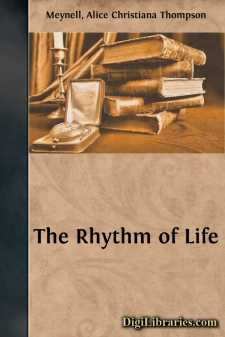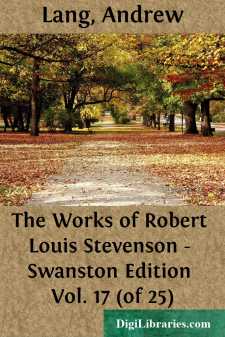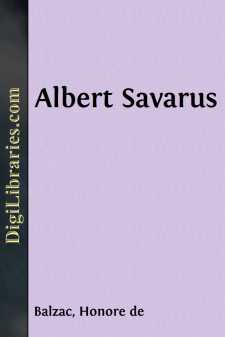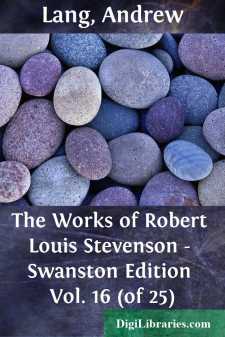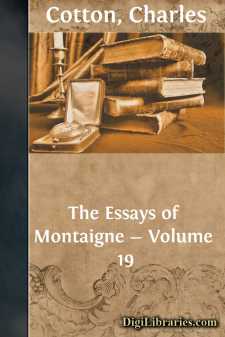Literary Collections
- American 84
- Ancient, Classical & Medieval 14
- Asian 1
- Australian & Oceanian 1
- Canadian 55
- Continental European 121
- English, Irish, Scottish, Welsh 179
- Essays 160
- General 24
- Letters 46
- Middle Eastern 1
Literary Collections Books
Sort by:
THE RHYTHM OF LIFE If life is not always poetical, it is at least metrical. Periodicity rules over the mental experience of man, according to the path of the orbit of his thoughts. Distances are not gauged, ellipses not measured, velocities not ascertained, times not known. Nevertheless, the recurrence is sure. What the mind suffered last week, or last year, it does not suffer now; but it will...
more...
by:
Andrew Lang
CHAPTER I THE ELEMENTS OF DISCORD: NATIVE The story I have to tell is still going on as I write; the characters are alive and active; it is a piece of contemporary history in the most exact sense. And yet, for all its actuality and the part played in it by mails and telegraphs and iron war-ships, the ideas and the manners of the native actors date back before the Roman Empire. They are Christians,...
more...
by:
Honore de Balzac
ALBERT SAVARUS One of the few drawing-rooms where, under the Restoration, the Archbishop of Besancon was sometimes to be seen, was that of the Baronne de Watteville, to whom he was particularly attached on account of her religious sentiments. A word as to this lady, the most important lady of Besancon. Monsieur de Watteville, a descendant of the famous Watteville, the most successful and illustrious of...
more...
CHAPTER I. THE rain had poured in torrents all day, and now, for the third time since morning, I came home, wet, uncomfortable and weary. I half dreaded to look at the slate, lest some urgent call should stare me in the face. "It must indeed be a case of life and death, that takes me out again to-night," said I, as my good wife met me in the entry, and with light hands, made active by love,...
more...
As the name of our city grew to be more and more a byword for sudden and fabulous wealth, not only were the Huns and the Slavs, the Czechs and the Greeks drawn to us, but it became the fashion for distinguished Englishmen and Frenchmen and sometimes Germans and Italians to pay us a visit when they made the grand tour of America. They had been told that they must not miss us; scarcely a week went by in...
more...
by:
Jonathan Swift
INTRODUCTION Swift has been styled the Prince of Journalists. Like most titles whose aim is to express in modern words the character and achievements of a man of a past age, this phrase is not of the happiest. Applied to so extraordinary a man as Jonathan Swift, it is both misleading and inadequate. At best it embodies but a half-truth. It belongs to that class of phrases which, in emphasizing a...
more...
At a time like the present, when in the opinion of many the great literatures of Greece and Rome are ceasing to hold the influence that they have so long exerted upon human thought, and when the study of the greatest works of the ancient world is derided as "useless," it may be too sanguine to hope that any attention can be paid to a literature that is quite as useless as the Greek; which deals...
more...
by:
Andrew Lang
THE SURNAME OF STEVENSON From the thirteenth century onwards, the name, under the various disguises of Stevinstoun, Stevensoun, Stevensonne, Stenesone, and Stewinsoune, spread across Scotland from the mouth of the Firth of Forth to the mouth of the Firth of Clyde. Four times at least it occurs as a place-name. There is a parish of Stevenston in Cunningham; a second place of the name in the Barony of...
more...
by:
Charles Dickens
1836 to 1839.Mr. John Hullah. Furnival's Inn,Sunday Evening (1836)(?).My dear Hullah,Have you seen The Examiner? It is rather depreciatory of the opera; but, like all inveterate critiques against Braham, so well done that I cannot help laughing at it, for the life and soul of me. I have seen The Sunday Times, The Dispatch, and The Satirist, all of which blow their critic trumpets against unhappy...
more...
by:
Charles Cotton
There is no desire more natural than that of knowledge. We try all ways that can lead us to it; where reason is wanting, we therein employ experience, "Per varios usus artem experientia fecit, Exemplo monstrante viam," ["By various trials experience created art, example shewing the way."—Manilius, i. 59.]...
more...


